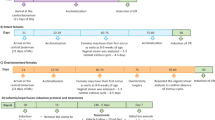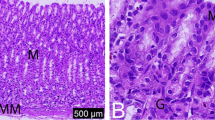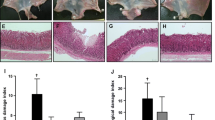Abstract
Background
Proanthocyanidin, a grape-seed polyphenol, has been reported to have protective properties against vascular injury and ulcers, preventive effects against atherosclerosis and cancer, and antioxidative effects, such as improving lipid metabolism and slowing aging. However, little has been reported on its antiulcer effects. We aimed to elucidate the antiulcer mechanism of proanthocyanidin.
Methods
Gravinol, containing 89.3% proanthocyanidin, was used. Proanthocyanidin solution, in distilled water, at 0.002%, 0.02%, 0.2%, or 1%, was given to rats ad libitum for 2 weeks. Distilled water was given to control rats. The effect of proanthocyanidin on gastric mucosal injury was investigated with the water-immersion restraint stress model. The ratios of areas of hemorrhagic erosion were compared as the lesion index. Myeloperoxidase activities were also examined, as an index of tissue injury. Superoxide dismutase activity was measured to examine its antioxidative effect. Furthermore, serum gastrin, somatostatin, histamine, and prostaglandin E2 levels were measured in this rat model.
Results
Proanthocyanidin administration significantly suppressed gastric mucosal injury, induced by water-immersion restraint stress, in a dose-dependent manner. Myeloperoxidase activities were also significantly inhibited, whereas superoxide dismutase activities were significantly stimulated. As to gastrointestinal hormones, the secretion of gastrin, somatostatin, and histamine was significantly inhibited, while prostaglandin E2 secretion was significantly stimulated.
Conclusions
Proanthocyanidin was shown to have a protective effect on the gastric mucosa. The mechanisms underlying the effect of proanthocyanidin were considered to be the following: anti-gastrin and anti-histamine effects to prevent attacks by water-immersion restraint stress, and mucoprotective properties, bestowed by increased prostaglandin and increased superoxide dismutase activities in the gastric mucosa.
Similar content being viewed by others
Author information
Authors and Affiliations
Rights and permissions
About this article
Cite this article
Iwasaki, Y., Matsui, T. & Arakawa, Y. The protective and hormonal effects of proanthocyanidin against gastric mucosal injury in Wistar rats. J Gastroenterol 39, 831–837 (2004). https://doi.org/10.1007/s00535-004-1399-5
Received:
Accepted:
Issue Date:
DOI: https://doi.org/10.1007/s00535-004-1399-5




